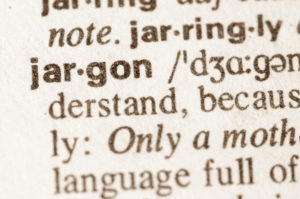[The Language Lab makes it easy for you to put research to work for you and your mission. Each installment gives you research-backed intel on one specific way you can work happier, smarter, and more effectively. To stay in the know, sign up to get Language Lab missives delivered directly to your inbox.]
********************
The One Thing You Need to Know:
Avoid jargon and keep readability high if you want to avoid coming off as deceptive and, in turn, turning off your supporters.
What’s all this about being a fraud?
When you’re communicating, you want people to trust you, right? You don’t want them wondering if you’re legit.Turns out, there are specific cues that send a “I’m not being straight with you” message, including:
- Using longer words
- Using fewer unique words
- Using lots of punctuation
- Having lower readability
- Being full of jargon
Are you making matters worse?
Based on research done by the Chronicle of Philanthropy, we know that one in three Americans lack faith in charities. What if you’re sending out those “I’m not being straight with you” cues without even knowing it?
From the Wordifier research, we know one thing that’s definitely making matters worse: on average nonprofits only use 810 unique words on their websites. That’s a mere .03% of the words available in the English language. Does the miniscule number of words nonprofits use reinforce mistrust? As a sector, could we increase donors’ faith in charities by increasing the number of unique words we use?
So what can you do to increase trust?
- Use proper punctuation. Here are some tips from Harvard College if you’re murky on punctuation. Grammarly is also an excellent resource on all things grammar.
- Use shorter words: Thsrs is a great tool for shortening up your words. As is the Hemingway Editor.
- Use a wider variety of words: The Wordifier can help you with this.
- Use serial commas: Okay, nothing in the research I’m citing says anything about this, but it’s always a good idea. Here’s why.
- Increase your readability: Turn on the Readability statistics in Word or use a tool like this one.
- Avoid jargon: The Chronicle of Philanthropy just ran a super article on jargon eradication. (Disclaimer: I’m quoted in this piece.)
Want a deeper dive?
Check out this report and this one for text analysis of fraudulent writing.
Also think about signing up for Claxon University–home of clear and compelling communication that raises awareness, increases donations, and does more good in the world!

